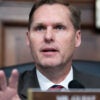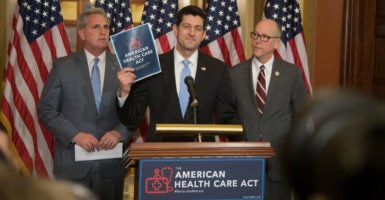The Obamacare replacement plan offered by House Republican leadership eventually would lower health insurance premiums and reduce federal budget deficits, although 24 million Americans no longer would have coverage, the Congressional Budget Office says.
In a report estimating the cost of the plan, released late Monday, the CBO projects the American Health Care Act would reduce budget deficits by $337 billion from 2017 to 2026.
About 14 million more Americans would not have health insurance if the House bill is enacted, compared with how many have it now under Obamacare, the report says. A total of 24 million more would be uninsured by 2026.
CBO’s “scoring” of the costs of the Obamacare replacement plan cleared it of one hurdle: Under the budget tool Republicans are using to pass the bill, called reconciliation, the legislation must save the government at least $2 billion over 10 years.
Under reconciliation, it takes only 51 votes for a bill to clear the Senate, rather than the 60 votes normally needed to end debate and proceed to a floor vote. Republicans have 52 seats in the Senate, and Democrats appear determined to defend former President Barack Obama’s signature legislative achievement.
By curbing the expansion of eligibility for Medicaid under Obamacare, the CBO report says, House Republicans’ plan–which so far has President Donald Trump’s backing–would decrease spending by $880 billion from 2017 to 2026:
[The] reduction would stem primarily from lower enrollment throughout the period, culminating in 14 million fewer Medicaid enrollees by 2026, a reduction of about 17 percent relative to the number under current law.
CBO notes that the drop in number of Americans covered would come in large part from removing Obamacare’s “individual mandate” that all Americans buy health insurance:
Most of that increase [in uninsured persons] would stem from repealing the penalties associated with the individual mandate. Some of those people would choose not to have insurance because they chose to be covered by insurance under current law only to avoid paying the penalties, and some people would forgo insurance in response to higher premiums.
By 2026, CBO estimates, approximately 52 million people would be uninsured, versus 28 million who would be without health insurance under Obamacare.
Insurance premiums in the individual market would increase by 15 percent to 20 percent in 2018 and 2019, the report says. The cause: The bill would eliminate penalties for not obtaining insurance, so more healthy people will choose not to buy it.
However, the report found that by 2026, premiums would be 10 percent lower than they currently are under Obamacare:
Under the legislation, insurers would be allowed to generally charge five times more for older enrollees than younger ones rather than three times more as under current law, substantially reducing premiums for young adults and substantially raising premiums for older people.
Under Obamacare, monthly premiums are expected to increase by an average of 25 percent from 2016 to 2017.
Addressing concerns that the Obamacare replacement plan would not cover as many Americans as Obamacare does, House Speaker Paul Ryan, R-Wis., said that is the price of not mandating coverage.
“The one thing I’m certain will happen is CBO will say, ‘Well, gosh. Not as many people will get coverage,’” Ryan said Sunday on CBS’ “Face the Nation.”
“You know why? Because this isn’t a government mandate,” Ryan said. “This is not the government that makes you buy what we say you should buy, and therefore the government thinks you’re all going to buy it.”
Without the mandate on individuals and employers, Ryan said, it is no surprise that some will lose coverage.
The Congressional Budget Office, part of the legislative branch, provides budget and economic information to Congress as its “scorekeeper” on spending and revenue.
As usual, CBO notes that its scores are cost estimates “intended to ensure that when the House and Senate consider legislation recommended by committees, members have information about the budgetary consequences of enacting that legislation that can be used to enforce budgetary rules or targets.”
In a graphic, The Wall Street Journal used the CBO numbers to show how the number of Americans without coverage would increase sharply under the Republican plan:
https://twitter.com/stuartathompson/status/841398469822672898
Health and Human Services Secretary Tom Price quickly took issue with the numbers, a CNN reporter tweeted.
Price on CBO numbers: "We disagree strenuously with the report that was put out."
— Phil Mattingly (@Phil_Mattingly) March 13, 2017
Senate Minority Leader Chuck Schumer, D-N.Y., tweeted that the Republican plan would cause “serious harm” to Americans.
CBO makes clear #Trumpcare will cause serious harm to millions of American families. This should be a looming stop sign for the GOP.
— Chuck Schumer (@SenSchumer) March 13, 2017
But Ryan praised the CBO report, saying it showed the GOP leadership’s plan would lower premiums and improve health care.
CBO report confirms it ? American Health Care Act will lower premiums & improve access to quality, affordable care. https://t.co/jNzmYFPe9H pic.twitter.com/f0NGuLiztl
— Paul Ryan (@SpeakerRyan) March 13, 2017
Melissa Quinn contributed to this report.
































